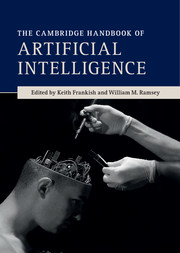Introduction
Published online by Cambridge University Press: 05 July 2014
Summary
Overview
Very generally, artificial intelligence (AI) is a cross-disciplinary approach to understanding, modeling, and replicating intelligence and cognitive processes by invoking various computational, mathematical, logical, mechanical, and even biological principles and devices. On the one hand, it is often abstract and theoretical as investigators try to develop theories that will enrich our understanding of natural cognition or help define the limits of computability or proof theory. On the other hand, it is often purely pragmatic as other investigators focus on the engineering of smart machines and applications. Historically, its practitioners have come from such disciplines as logic, mathematics, engineering, philosophy, psychology, linguistics, and, of course, computer science. It forms a critical branch of cognitive science since it is often devoted to developing models that explain various dimensions of human and animal cognition. Indeed, since its inception in the mid twentieth century, AI has been one of the most fruitful new areas of research into the nature of human mentality. Today, it is impossible to be a serious cognitive scientist or philosopher of mind without at least some familiarity with major developments in AI. At the same time, anyone who uses modern technology is probably enjoying features that, in one way or another, had their origin in AI research, and AI technology will undoubtedly play an increasingly large role in our lives in coming decades.
Information
- Type
- Chapter
- Information
- The Cambridge Handbook of Artificial Intelligence , pp. 1 - 12Publisher: Cambridge University PressPrint publication year: 2014
Accessibility standard: Unknown
Why this information is here
This section outlines the accessibility features of this content - including support for screen readers, full keyboard navigation and high-contrast display options. This may not be relevant for you.Accessibility Information
- 5
- Cited by
